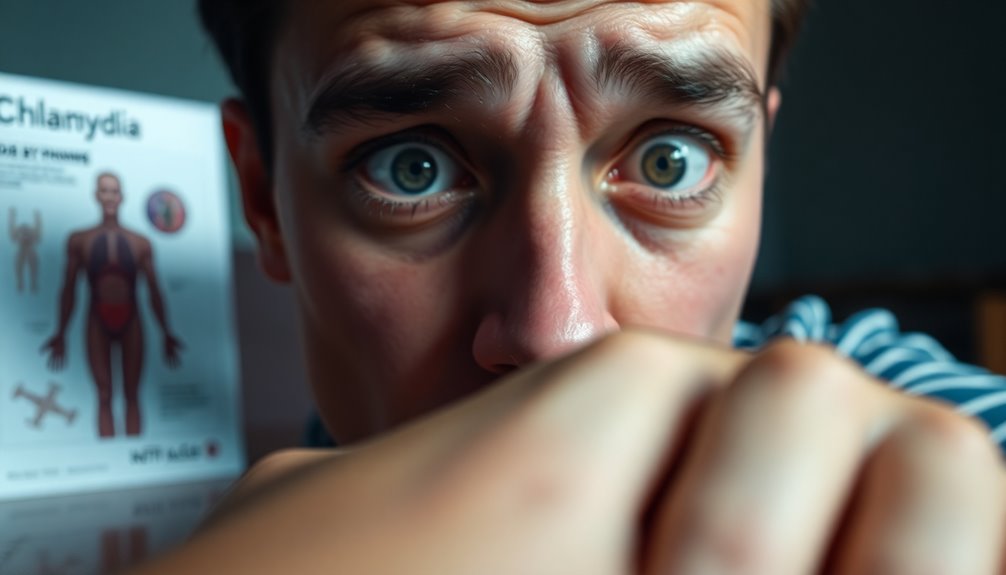Yes, you can get chlamydia from oral sex. The infection spreads when infected genital secretions come into contact with the mouth, throat, or genitals. While the risk is lower than with vaginal or anal sex, it's still significant, especially for younger individuals. If you're engaging in oral sex, remember that using condoms or dental dams can help reduce the risk. Symptoms of throat chlamydia might include a sore throat, and many people remain asymptomatic. It's crucial to stay informed about transmission routes and testing options, so you can keep yourself and your partners safe.
Key Takeaways
- Yes, chlamydia can be transmitted through oral sex by contact with infected genital secretions.
- The risk of transmission through oral sex is lower than vaginal or anal sex but still significant.
- Individuals can unknowingly spread chlamydia, making regular testing essential for sexual health.
- Symptoms of throat chlamydia may include a sore throat or redness, requiring medical attention.
- Using barrier methods like condoms and dental dams can help reduce the risk of transmission.
Understanding Chlamydia Transmission

How can chlamydia be transmitted through oral sex?
Chlamydia can be transmitted through oral sex when there's contact between infected genital secretions and the mucous membranes in your mouth or throat.
While the risk of getting chlamydia is lower than with vaginal or anal sex, it's still a concern, especially if you're receiving or giving oral sex to people who've chlamydia.
If your partner has throat chlamydia, they can infect your genital area, and vice versa.
The bacteria thrive in moist environments, making oral sex a potential transmission route.
To minimize this risk, using condoms or dental dams as a barrier method during oral sex is highly recommended, helping protect you and your sexual partners.
Risks of Oral Sex

What're the real risks of engaging in oral sex?
While it might seem safer than other sexual activities, oral sex can still transmit chlamydia. Chlamydia is passed when you have oral contact with an infected partner's genital area or vice versa.
Though the risk is lower than with anal or vaginal sex, it's still significant, especially among young individuals aged 14-24. Infected individuals can unknowingly spread the infection, which may even infect the throat, leading to symptoms like a sore throat.
Regularly testing for chlamydia is essential for maintaining your sexual health. Using a condom or dental dams during oral sex can greatly reduce the risk of sexually transmitted infections, including getting chlamydia.
Stay informed and communicate openly with partners.
Prevention Strategies

To effectively reduce the risk of chlamydia during oral sex, it's important to implement several prevention strategies.
First, always use barrier methods like condoms for fellatio and dental dams for cunnilingus and anilingus. These greatly lower the chances of transmitting sexually transmitted infections (STIs).
Regular STI screenings are essential, allowing for early detection and treatment of chlamydia.
It's also critical to have open communication with your sexual partners about STI status and safe practices to prevent the spread of infections.
Avoid unprotected sex, particularly with new or multiple partners, as this heightens risk.
Finally, educating yourself about the transmission routes and symptoms of chlamydia empowers you to make informed decisions regarding your sexual health.
Symptoms of Chlamydia

Although many people infected with chlamydia don't show symptoms, it's important to be aware of what to look for. This sexually transmitted infection (STI) can manifest within a week to several months after exposure.
Common symptoms include abnormal genital discharge, a burning sensation during urination, and abdominal pain. If you've engaged in oral sex, watch for symptoms like a sore throat or redness in the throat area.
Women might experience bleeding between periods or after intercourse, while men may notice testicular pain or swelling.
It's vital to seek medical advice if you experience any of these symptoms or have been in contact with an infected partner, as untreated chlamydia can lead to serious long-term health issues.
Testing and Treatment Options

When you suspect you might have chlamydia, getting tested as soon as possible is vital for your health. Regular STI screenings are important, especially for those with new sexual partners. Testing usually involves a urine sample or swabs from the genital area, and self-swabbing can add comfort.
| Testing Method | Treatment Options | Follow-Up |
|---|---|---|
| Urine Sample | Antibiotics | Retest after 4 weeks (if pregnant) |
| Genital Swab | Single or 7-14 days course | Make sure partners are notified |
| Self-Swabbing | Effective | Confirm infection eradicated |
Antibiotics effectively treat chlamydia, but follow-up testing is vital to confirm the infection's gone, particularly if you're pregnant.
Frequently Asked Questions
Is It Rare to Get Chlamydia From Oral?
Yes, it's considered rare to get chlamydia from oral sex, but it can happen.
If you or your partner has throat chlamydia, engaging in oral contact increases the risk.
Many infections don't show symptoms, so you mightn't even know you're at risk.
To protect yourself, using barrier methods like condoms or dental dams during oral sex can greatly lower your chances of transmission and keep you safer overall.
Can Chlamydia Be Spread Through Saliva?
Saliva's spread is subtle, but chlamydia's chances in this scenario are slim.
While the bacteria can linger in oral secretions, they're not easily transmitted through saliva alone.
It's crucial to be aware that engaging with an infected partner could still pose risks.
So, if you're worried, always consider using protection and get tested regularly.
Staying informed and proactive helps you protect yourself and your partners from potential infections.
Does Oral Chlamydia Go Away?
Oral chlamydia can sometimes resolve on its own, but it's risky to wait it out. You should seek treatment because untreated infections can lead to serious health issues.
Antibiotics work well and usually improve symptoms within a week. Even if you feel better, the bacteria might still be in your body, so follow-up testing is vital to guarantee the infection is gone.
Regular STI screenings are important, especially if you're sexually active.
What STDS Can You Get From Receiving Oral Sex?
Picture yourself at a lively party, laughter echoing around you, unaware of the hidden risks that lurk in intimate moments.
When you receive oral sex, you can pick up various STIs, including chlamydia, gonorrhea, syphilis, herpes, and HPV.
Many of these infections mightn't show symptoms right away, making regular testing essential.
Stay informed and take preventive measures to protect your health and enjoy those moments with peace of mind.
Conclusion
In the grand tapestry of sexual health, being informed about chlamydia is essential. Yes, you can get chlamydia from oral sex, so it's important to prioritize safe practices. Protect yourself and your partner with consistent testing and open conversations. Just like a gardener tends to their plants, nurturing your sexual health guarantees a flourishing relationship. Remember, knowledge is your best defense, and being proactive today can prevent complications tomorrow. Stay safe and stay informed!










